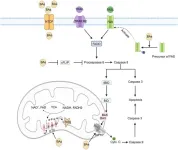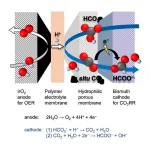(Press-News.org) People who eat more ultra-processed foods (UPF) are at increased risk of developing type 2 diabetes, but this risk can be lowered by consuming less processed foods instead, finds a new study led by researchers at UCL.
The study, published in The Lancet Regional Health – Europe in collaboration with experts at the University of Cambridge and Imperial College London, investigated the relationship between the degree of food processing and type 2 diabetes risk, including which kinds of UPF were most high-risk.
The team analysed UPF intake and health outcomes for 311,892 individuals from eight European countries over 10.9 years on average, during which time 14,236 people developed type 2 diabetes.
They found that every 10% increase in the amount of ultra-processed foods in a person’s diet is linked with a 17% increase in type 2 diabetes risk, but this risk can be lowered by consuming less-processed foods instead.
The highest risk UPF groups were savoury snacks, animal-based products such as processed meats, ready meals, and sugar-sweetened and artificially-sweetened beverages, suggesting that particular attention should be paid to these foods to help tackle ill-health.
The degree of processing in foods is most often assessed using the Nova classification, which divides foods into four groups: unprocessed or minimally processed foods (MPF) such as eggs, milk, and fruit; processed culinary ingredients (PCI) such as salt, butter and oil; processed foods (PF) like tinned fish, beer and cheese; and ultra-processed foods such as ready-to-eat/heat mixed dishes, savoury snacks, sweets and desserts.
The exact causes of the link between UPF and type 2 diabetes are unconfirmed, though several factors are thought to be at play including overconsumption and weight gain. In a previous study, backed up by new analysis in this study, increased body fat accounted for around half the association.
Samuel Dicken, first author of the study from UCL Division of Medicine, said: “We know that ultra-processed foods are associated with a higher risk of certain diseases such as type 2 diabetes. As expected, our findings confirm this link and show that every 10% increase in the diet from UPF increases the risk of developing type 2 diabetes considerably.
“Most studies to date only consider UPF as a whole, but we also suspect that there may be different risks associated with different types of UPF, and the risks of other processing groups have not been well researched. Our analysis goes a step further than previous studies, by looking at all four processing groups in the Nova classification to gauge the impact on type 2 diabetes risk when we substitute UPF with less processed foods, as well as looking at nine UPF subgroups.
“The good news is that replacing UPF with less processed foods was associated with a reduced type 2 diabetes risk.”
In the study, researchers from UCL analysed data from the EPIC study, which has investigated the relationship between diet, lifestyle, and environmental factors, and the incidence of chronic diseases in more than half a million Europeans over time.
Additional analysis on the data was performed to separate UPF into nine subgroups1 in order to better understand how level of processing affects type 2 diabetes risk.
Alongside analysing how eating UPF affected a person’s risk of developing type 2 diabetes, the researchers performed substitution modelling on the data to see how, theoretically, replacing one Nova food group with another would affect type 2 diabetes risk.
The results showed that substituting 10% of UPF in the diet with 10% of MPF/PCI reduced type 2 diabetes risk by 14%.
Substituting 10% of UPF in the diet with 10% of PF reduced diabetes risk by 18%. The authors say this may be down to the fact that 30-50% of PF intake in this study came from beer and wine, which have been associated with a lower risk of type 2 diabetes in a previous EPIC study. PF also includes salted nuts, artisanal breads, and preserved fruits and vegetables.
Analysis of the nine UPF subgroups showed that savoury snacks, animal-based products, ready meals, and sugar-sweetened and artificially-sweetened beverages were associated with higher incidence of type 2 diabetes.
High proportions of these less healthy foods contributed to overall type 2 diabetes risk. In the top 25% of UPF consumers, where UPF made up 23.5% of their total diet, sweetened beverages alone accounted for nearly 40% of their UPF intake and 9% of their diet overall.
However, UPF breads, biscuits and breakfast cereals, sweets and desserts, and plant-based alternatives were associated with lower incidence of type 2 diabetes.
Professor Rachel Batterham, senior author of the study from UCL Division of Medicine, said: “The UPF subgroup analysis in this study has been revealing and confirms that not all foods categorised as UPF are alike in terms of the health risks associated with them.
“Breads and cereals, for example, are a staple of many people’s diets. Based on our results, I think we should treat them differently to savoury snacks or sugary drinks in terms of the dietary advice we provide.”
The authors say that, due to the observational nature of the study, it can only measure associations rather than causal effects.
The UCL team are currently conducting a trial to assess the impact of UPF versus MPF diets meeting healthy diet guidance, which will further clarify the results of this study. The results of this trial are expected to be published in 2025.
In 2023, the UK Scientific Advisory Committee on Nutrition (SACN) reviewed the available scientific evidence on UPFs and published a report stating that increased consumption of processed foods, particularly UPFs, was associated with an increased risk of health issues such as obesity, chronic diseases like type 2 diabetes, and depression. The report also highlighted the need for additional research to understand the cause of these associations.
Professor Marc Gunter, an author of the study from Imperial College London and one of the coordinators of the EPIC study, said: “The findings from this study add to the growing body of research that links consumption of UPF with higher risk of certain chronic diseases including obesity, cardiometabolic diseases and some cancers. While such a study cannot determine causal relationships, it does suggest that reducing consumption of some UPF and replacing them with unprocessed, whole foods, might lower risk of type 2 diabetes. Further research to understand mechanisms and potential causal pathways is now needed.”
Notes to Editors:
For more information, please contact:
Dr Matt Midgley
+44 (0)20 7679 9064
m.midgley@ucl.ac.uk
1 The nine subgroups were:
Breads, biscuits and breakfast cereals
Sauces, spreads, and condiments
Sweets and desserts
Savoury snacks
Plant-based alternatives
Animal-based products
Ready-to-eat/heat mixed dishes
Artificially and sugar-sweetened beverages
Alcoholic drinks
Other ultra-processed foods
Publication:
Samuel Dicken et al. ‘Food consumption by degree of food processing and risk of type 2 diabetes mellitus: a prospective cohort analysis of the European Prospective Investigation into Cancer and Nutrition (EPIC)’ is published in The Lancet Regional Health – Europe and is strictly embargoed until Monday 16 September at 00:01 BST / 15 September at 19:01 ET.
DOI: https://doi.org/10.1016/j.lanepe.2024.101043
About UCL – London’s Global University
UCL is a diverse global community of world-class academics, students, industry links, external partners, and alumni. Our powerful collective of individuals and institutions work together to explore new possibilities.
Since 1826, we have championed independent thought by attracting and nurturing the world's best minds. Our community of more than 50,000 students from 150 countries and over 16,000 staff pursues academic excellence, breaks boundaries and makes a positive impact on real world problems.
The Times and Sunday Times University of the Year 2024, we are consistently ranked among the top 10 universities in the world and are one of only a handful of institutions rated as having the strongest academic reputation and the broadest research impact.
We have a progressive and integrated approach to our teaching and research – championing innovation, creativity and cross-disciplinary working. We teach our students how to think, not what to think, and see them as partners, collaborators and contributors.
For almost 200 years, we are proud to have opened higher education to students from a wide range of backgrounds and to change the way we create and share knowledge.
We were the first in England to welcome women to university education and that courageous attitude and disruptive spirit is still alive today. We are UCL.
www.ucl.ac.uk | Follow @uclnews on Twitter | Read news at www.ucl.ac.uk/news/ | Listen to UCL podcasts on SoundCloud | View images on Flickr | Find out what’s on at UCL Minds
END
Replacing ultra-processed foods in diet reduces type 2 diabetes risk
2024-09-15
ELSE PRESS RELEASES FROM THIS DATE:
High-Dose vitamin D3 does not provide benefit for metastatic colorectal cancer
2024-09-15
RESEARCH SUMMARY
Study Title: SOLARIS (Alliance A021703): A multicenter double-blind phase III randomized clinical trial of vitamin D combined with standard chemotherapy plus bevacizumab in patients with previously untreated metastatic colorectal cancer.
Publication: European Society for Medical Oncology 2024 Abstract LBA26
Dana-Farber Cancer Institute authors: Kimmie Ng, MD, MPH, Nadine McCleary, MD, MPH, Jeffrey A. Meyerhardt, MD, MPH
Summary: A double-blind randomized phase 3 clinical trial led by Dana-Farber Cancer Institute researchers and conducted across several hundred cancer centers in the U.S. tested the addition of high-dose ...
Long-term metastatic melanoma survival dramatically improves on immunotherapy
2024-09-15
Long-term data from a landmark international trial show about half of patients with metastatic melanoma treated with a combination of immune checkpoint inhibitors survive cancer-free for 10 years or more, according to a new report from Weill Cornell Medicine and Dana-Farber Cancer Center investigators and their colleagues.
The 10-year follow-up study, published Sept. 15 in the New England Journal of Medicine, will bring the phase 3 CheckMate 067 trial to a close. The trial, which followed 945 patients treated at 137 sites in 21 countries, demonstrated that combining ...
Contrail avoidance is less likely to damage climate by mistake than previously thought
2024-09-15
A new study allays fears that rerouting flights to avoid forming climate-warming contrails could result in inadvertently making climate warming worse.
Researchers from Sorbonne Universite and the University of Reading found that for most flights that form contrails in the North Atlantic, the climate benefit of avoiding the contrail outweighs the extra carbon dioxide emitted from flying a different route.
Contrail avoidance requires comparing the climate impacts of carbon dioxide and contrails, called CO2 equivalence. Different methods have been proposed, and the choice of which has been largely political. Scientists feared that some choices ...
Breast cancer research: New studies show how post-treatment lifestyle choices shape long-term outcomes after diagnosis
2024-09-15
Young patients can safely breastfeed without increasing the risk of cancer recurrence or new cancer in the opposite breast
Telephone-based intervention can successfully prompt patients who are overweight to exercise more, lowering their weight
BARCELONA, SPAIN – Three studies led by Dana-Farber Cancer Institute researchers have encouraging implications for patients with breast cancer. Two studies focus on breastfeeding after breast cancer diagnosis and treatment. The studies found it was safe and feasible for young patients carrying specific genetic variations to breastfeed without raising their risk of a cancer recurrence or a cancer in the other breast, and that it was safe ...
New meta-analysis shows that hormone therapy can significantly reduce insulin resistance
2024-09-14
CLEVELAND, Ohio (Sept 10, 2024) –Menopausal women are at greater risk of insulin resistance as a result of declining estrogen levels. Previous studies evaluating the potential benefits of hormone therapy on insulin resistance have produced mixed results. However, a new meta-analysis of 17 different randomized, controlled trials suggests hormone therapy can be beneficial. Results of the meta-analysis will be presented at the 2024 Annual Meeting of The Menopause Society in Chicago September 10-14.
Insulin resistance can occur in men or women, but menopausal women are at ...
Genomics reveals sled dogs’ Siberian lineage
2024-09-14
ITHACA, N.Y. – New research co-led by Cornell University examines thousands of years of Arctic sled dog ancestry and reveals when and how Siberian and Alaskan sled dogs’ DNA mixed.
“There was a real concern from Siberian breeders – who were mostly racing their dogs – that they were sending out their dogs’ DNA samples for analysis, more for the context of health traits, and they were getting breed ancestry information back that said their dog was not 100% Siberian husky,” said Heather Huson, a former ...
ESMO: Combination therapy reduced agitated delirium in patients with advanced cancers
2024-09-14
ABSTRACT: 1476O
BARCELONA, Spain ― Treatment with a combination of haloperidol and lorazepam reduced symptoms of agitated delirium, a common end-of-life condition for patients with advanced cancers, compared with haloperidol alone, according to a new study led by researchers at The University of Texas MD Anderson Cancer Center. The findings were presented today at the 2024 European Society for Medical Oncology (ESMO) Congress.
Agitated delirium occurs when a patient’s brain function begins to deteriorate as their cancer advances, resulting in many patients beginning to behave aggressively or abnormally. Although the use of medication ...
SOPHiA GENETICS presents ground-breaking multimodal research on AI-driven patient stratification at ESMO 2024
2024-09-14
Boston, MA and Rolle, Switzerland, September 14, 2024 – SOPHiA GENETICS (Nasdaq: SOPH), a cloud-native healthcare technology company and a leader in data-driven medicine, will unveil new research at the European Society for Medical Oncology (ESMO) 2024. The study, conducted in collaboration with AstraZeneca, leverages advanced AI-driven techniques to identify subgroups of stage IV non-small cell lung cancer (NSCLC) patients who could most benefit from the addition of tremelimumab to durvalumab and chemotherapy.
The research is a retrospective, multimodal analysis of the POSEIDON Phase 3 clinical trial (NCT03164616). This trial originally demonstrated that the combination of tremelimumab, ...
Mitochondria at the crossroads of cholestatic liver injury: Targeting novel therapeutic avenues
2024-09-14
Bile acids are essential signaling molecules derived from cholesterol metabolism in the liver and are crucial for the digestion and absorption of fats. These molecules undergo further modification in the intestines by the gut microbiome. However, disruptions in bile flow, a condition known as cholestasis, can lead to the pathological accumulation of hydrophobic BAs in the liver and bloodstream. This accumulation not only exacerbates liver damage but also induces significant disturbances in cellular processes. The review focuses on recent developments in understanding how BAs contribute to liver injury by affecting mitochondrial function, endoplasmic reticulum ...
Scientists reveal new design for cells turning carbon dioxide into a green fuel
2024-09-14
Tokyo, Japan – Researchers from Tokyo Metropolitan University have made strides forward in realizing industrial conversion of bicarbonate solution made from captured carbon to a formate solution, a green fuel. Their new electrochemical cell, with a porous membrane layer in between the electrodes, overcomes major issues suffered in reactive carbon capture (RCC) and achieves performances rivaling energy-hungry gas-fed methods. Processes like theirs directly add value to waste streams and are key to realizing net zero emissions.
Carbon capture technology ...





